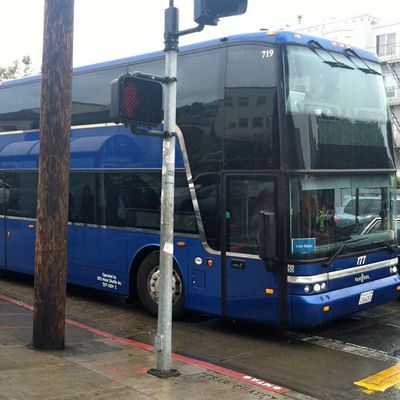
After I wrote earlier this month about the class divide surrounding San Francisco’s transportation strike, several thoughtful commenters accused me of being excessively paranoid about the growth of private-sector services like Uber and Lyft, and the shuttles run by Silicon Valley tech companies like Google and Facebook. In particular, my worry that “when [Bay Area] policy-makers begin to see [Uber, Lyft, corporate tech shuttles] as legitimate replacements for public infrastructure, their incentives to make public services better will disappear” seemed to strike some folks as overblown. Why would local politicians throw public transportation under the bus, just because premium options exist?
In fact, my paranoia was somewhat off-mark. My mistake was using the future tense, when, in fact, these politicians are already caving to Silicon Valley’s transportation preferences.
Here’s a summary from the Chronicle:
The Municipal Transportation Agency is proposing an 18-month test of a shuttle policy designed to support the private buses, which transport as many as 35,000 workers a day, mostly to and from tech companies in Silicon Valley, while reducing conflicts with Muni buses and establishing guidelines to help the private and public buses get along.
Silicon Valley shuttles have been commandeering Muni stops for years. It’s always been illegal. And yet, city officials have mostly turned a blind eye. Now, instead of forcing these buses off their turf, they’re bowing. It’s as if Goldman Sachs were running its own trains on the 2/3 line, and instead of shutting them down, the MTA decided to rearrange its own schedules to make sure Goldmanites could get from the Upper West Side to work on time.
In my experience, these Silicon Valley shuttles are very popular with the young, educated, upper-income tech workers who take them, and abhorred by most other city residents. According to the Chronicle, residents have been filing “complaints about shuttles forcing Muni buses to disgorge passengers in the middle of streets, blocking crosswalks, backing up traffic, traveling on restricted streets and interfering with bicycles using bike lanes.”
These buses do have positive effects — for one, they displace thousands of private cars that would otherwise be driven to work. But they also carry costs. And now, those costs have been passed to Muni passengers, thanks to local authorities who have looked at a functioning, well-funded network of private, wi-fi enabled luxury buses, compared it to the dilapidated and problem-plagued public bus system, and decide to let the former to continue to encroach on the latter. As a result, the private grid continues to grow and improve, while Muni gets the shaft. If you’re a working-class San Francisco resident who gets stuck in the middle of the street thanks to a Facebook bus, or is late for work because the Genentech shuttle is idling at your bus stop, you could be forgiven for a little hostility toward the tech sector, and the local politicians who continue to capitulate to it.





























